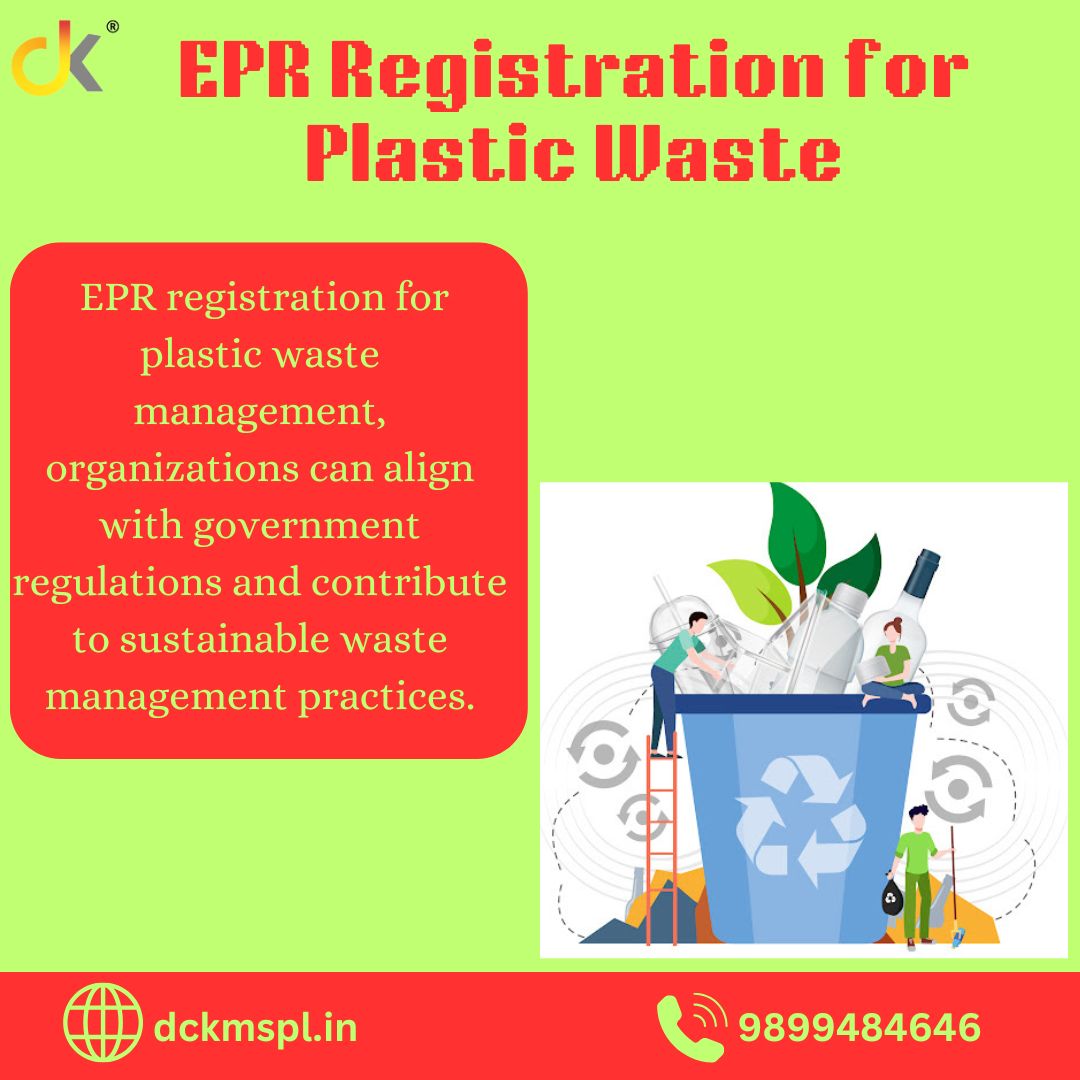Extended Producer Responsibility (EPR) is a globally recognized approach to managing plastic waste and ensuring sustainable practices in production and consumption. In India, EPR registration for plastic waste management has become a critical mandate for businesses involved in the production, import, or use of plastic materials. This initiative not only supports environmental preservation but also aligns businesses with the growing global commitment to sustainability.
Understanding EPR and Its Importance
EPR registration for plastic waste management is a policy framework under which manufacturers, importers, and brand owners (PIBOs) are held responsible for the entire lifecycle of their plastic products, including post-consumer waste management. By registering for EPR, these stakeholders commit to taking proactive steps to reduce the environmental impact of plastic waste.The rising challenge of plastic pollution has made EPR an essential mechanism to ensure that businesses actively contribute to waste minimization, recycling, and sustainable production practices. In India, the Plastic Waste Management (PWM) Rules 2016, amended in 2022, provide a robust structure for implementing EPR.
Why EPR Registration is Essential
EPR registration is more than a compliance requirement; it plays a vital role in addressing the global plastic waste crisis. Here’s why EPR is critical:
- Promotes Recycling: Encourages the establishment of recycling units and the adoption of circular economy practices.
- Reduces Plastic Pollution: Decreases the burden of plastic waste on the environment.
- Encourages Innovation: Motivates businesses to develop eco-friendly alternatives and improve the recyclability of products.
- Aligns with Sustainability Goals: Helps businesses meet their environmental, social, and governance (ESG) goals.
- Enhances Brand Image: Demonstrates corporate responsibility, enhancing trust among consumers and stakeholders.
Who Needs EPR Registration?
EPR registration is mandatory for the following entities under the PWM Rules:
- Manufacturers: Companies producing plastic products or packaging.
- Importers: Entities importing plastic goods or packaging materials.
- Brand Owners: Companies using plastic for packaging their products.
- Plastic Waste Processors: Firms involved in recycling or processing plastic waste.
Steps to Complete EPR Registration
- Understand Legal Requirements: Familiarize yourself with the PWM Rules and amendments specific to EPR.
- Application Submission: Register on the Central Pollution Control Board (CPCB) or State Pollution Control Board (SPCB) portal and submit the application form along with the necessary documentation.
- Compliance Plan: Outline a plastic waste management plan detailing the quantity of plastic produced, recycled, and disposed of.
- Fees Payment: Pay the applicable registration fee as determined by the regulatory authority.
- Approval and Certification: Upon successful review, obtain the EPR registration certificate.
Documents Required for EPR Registration
- Company registration certificate.
- GST certificate.
- Import-export code (if applicable).
- Details of plastic usage or production.
- Recycling and waste management plan.
- Memorandum of Understanding (MoU) with recyclers or waste management agencies.
Challenges in EPR Registration
While EPR is a powerful tool for environmental management, businesses often face challenges during registration:
- Complex Regulatory Framework: Navigating diverse and evolving regulations can be daunting.
- Data Management: Accurately documenting and reporting plastic usage and waste management practices require meticulous record-keeping.
- Limited Recycling Infrastructure: Insufficient facilities in some regions hinder compliance efforts.
- Cost Implications: High costs of implementation, including waste collection and recycling, can burden businesses.
- Awareness and Training: Lack of awareness among stakeholders about EPR obligations and benefits.
Benefits of EPR Registration
Despite the challenges, EPR registration offers significant advantages:
- Environmental Conservation: Mitigates plastic pollution, contributing to cleaner ecosystems.
- Regulatory Compliance: Ensures businesses adhere to legal mandates, avoiding penalties and legal actions.
- Economic Opportunities: Creates new markets for recycled products and waste management solutions.
- Stakeholder Trust: Builds a reputation for environmental responsibility among consumers and investors.
- Global Competitiveness: Aligns Indian businesses with global sustainability standards, boosting export opportunities.
Role of EPR in Building a Circular Economy
EPR serves as a cornerstone for establishing a circular economy where waste materials are reused, recycled, or transformed into valuable resources. By incentivizing waste collection and recycling, EPR ensures that plastic materials are kept within the economy rather than being discarded into the environment.
Technological Integration in EPR
Technology plays a vital role in streamlining EPR processes:
- Blockchain for Transparency: Ensures accurate tracking of plastic usage and recycling activities.
- IoT for Waste Monitoring: Sensors and devices provide real-time data on waste collection and processing.
- Digital Platforms: Online EPR management systems simplify compliance reporting and monitoring.
Government Initiatives and Support
The Indian government has taken several steps to strengthen EPR implementation:
- Amendments to PWM Rules: Updates to make EPR policies more comprehensive and enforceable.
- CPCB Portal: A centralized platform for seamless EPR registration and monitoring.
- Public-Private Partnerships: Collaborations to enhance recycling infrastructure and awareness campaigns.
Case Studies: Successful EPR Implementation
- Corporate Leaders: Companies like Nestlé and Coca-Cola have adopted robust EPR frameworks, investing in recycling projects and alternative materials.
- Startups: Innovative startups are developing eco-friendly packaging solutions and advanced recycling technologies to support EPR goals.
Conclusion
EPR registration for plastic waste management is a crucial step toward combating plastic pollution and building a sustainable future. By adhering to EPR guidelines, businesses not only fulfill their regulatory obligations but also contribute to environmental preservation and societal well-being.The path to effective plastic waste management may be challenging, but it is essential for achieving a cleaner and greener planet. With collaborative efforts from government bodies, businesses, and citizens, EPR can transform how plastic waste is managed, turning a global environmental challenge into an opportunity for innovation and sustainability.

